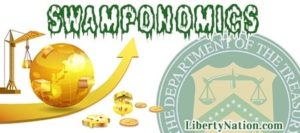The Federal Reserve has a hamper full of dirty laundry, and it is finally being aired out. In the early days of the COVID-19 public health crisis, the U.S. central bank initiated an unlimited version of quantitative easing, purchasing $120 billion in corporate and government bonds and mortgage-backed securities (MBS) every month. It also slashed interest rates to nearly zero. The purpose was to cushion the blow from the coronavirus-induced market meltdown. Twenty months later, the leading benchmark indices are trading at all-time highs. If you were in the market, you made money. It turns out that so did members of the Eccles Building.
Jerome Powell and Associates
Liberty Nation recently reported that Dallas Fed Bank President Robert Kaplan and Boston Fed Bank President Eric Rosengren completed multi-million-dollar stock purchases when the central bank was bailing out the New York Stock Exchange, giving the appearance of conflicts of interest. The two men issued apologies and divested from their positions.
CNBC dug a little deeper and discovered that Fed officials profit from the entity’s QE efforts and Fed Chief Jerome Powell. According to the business news network, Powell held as much as $2.5 million in municipal bonds dating back to 2019. One of the investments the Fed made was scooping up more than $5 billion in munis. In addition, Richmond Fed President Thomas Barkin maintained as much as $3 million in individual corporate bonds, like Home Depot and Pepsi, before the economic collapse. Last year, the Fed launched a corporate bond-buying facility and acquired $46.5 billion in these securities.
CNBC asked this pertinent question: “Should the Fed have banned officials from holding, buying, and selling the same assets the Fed itself was buying last year when it dramatically widened the types of assets it would purchase in response to the pandemic?” But, after it was discovered Rosengren and Kaplan took part in questionable deeds, Powell recently ordered a comprehensive review of the Fed’s ethics rules. A statement from the Fed noted that the sweeping assessment “will assist in identifying ways to further tighten those rules and standards.”
Despite Greg Valliere, chief U.S. policy strategist at AGF Investments, averring that the world’s most powerful body possessed “a squeaky-clean reputation,” it has been anything but if you read through the Fed’s century-old history.
The Evergrande Illusion
China is bracing for another financial crisis, 20 months after enduring the COVID-19 economic downturn. In fact, Beijing might be having its own Lehman moment soon should one property juggernaut default on hundreds of billions of debt that it has accumulated in recent years.
Evergrande, an investment holding giant that invests, operates, and manages a broad array of real estate properties, and has delved into the new energy vehicle realm, controls approximately $300 billion in liabilities. The belief is that Evergrande is likely to fail to make an upcoming interest payment and even miss a substantial principal payment on an exorbitant loan. This could create significant trouble for the overall economy, from banks to suppliers to investors. The consensus is that China will be facing its biggest test in many years, resulting in the People’s Bank of China (PBoC) injecting $14 billion into the banking system, the largest amount since February. Meanwhile, Chinese junk bond yields have skyrocketed to 11%, up from around 3% only a couple of months ago.
 But could it be too little too late? Financial institutions have been reducing their cash flows to companies with connections to the 25-year-old firm, and debt recovery efforts would trigger fire sales of assets almost immediately. Small banks would need to recover from the plethora of non-performing loans quickly, and authorities would need to contain the fallout with emergency measures.
But could it be too little too late? Financial institutions have been reducing their cash flows to companies with connections to the 25-year-old firm, and debt recovery efforts would trigger fire sales of assets almost immediately. Small banks would need to recover from the plethora of non-performing loans quickly, and authorities would need to contain the fallout with emergency measures.
While it may have caught the global markets by surprise, Liberty Nation has sounded alarm bells about Beijing’s intensifying and inevitable bond calamity. Bloomberg summarized the situation with this prognostication: “A benign outcome is far from assured.” Whatever the case, civil unrest will grow as people storm the company’s headquarters, with some reportedly taking management hostage.
$3,586,456,000,000
According to the Monthly Treasury Statement, in the first 11 months of the fiscal year 2021, the federal government collected a record $3,586,456,000,000 in total taxes. Uncle Sam further received $1,829,589,000,000 in individual income taxes, also an all-time high. Yet, despite the record-breaking tax confiscation, Washington still ran one of the largest budget deficits in U.S. history, totaling $2,710,635,000,000.
Here are the biggest cash cows for politicians:
- Corporate Income Taxes: $285,119,000,000
- Social Insurance and Retirement Taxes: $1,190,606,000,000
- Excise Taxes: $64,648,000,000
- Estate and Gift Taxes: $24,708,000,000
- Customs Duties: $72,128,000,000
For outlays, here is a list of the costliest programs:
- Department of Health and Human Services: $1,340,131,000,000
- Social Security Administration: $1,092,771,000,000
- Department of Defense: $653,852,000,000
Overall, the United States faces a national debt of about $28 trillion – and counting. The debt rises $10,000 per second, America’s unfunded liabilities top $156 trillion, and the debt per taxpayer is close to $230,000. The country’s fiscal standing is deteriorating every day. Even if politicians were to confiscate the wealth of every billionaire in the Land of the Free, it would only be enough to keep the doors open for a few months. Uncle Sam is broke.
~
Read more from Andrew Moran.




